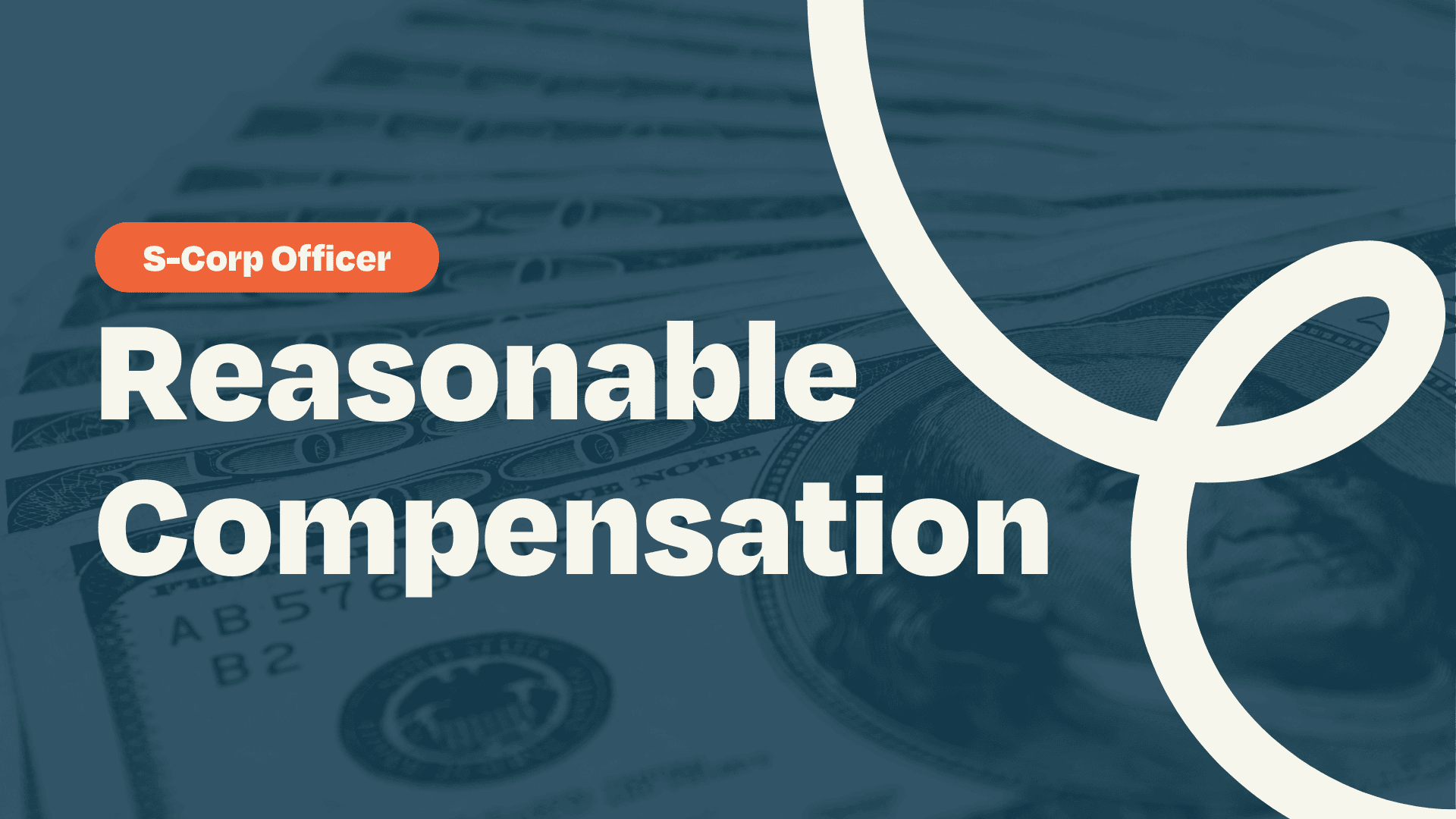Complete Guide to SaaS Accounting: Strategies for Financial Success
If you’re running a SaaS company, you already know that managing finances isn’t as straightforward as it is for traditional businesses. The...

The tax world doesn't stand still, and neither should your approach to S-Corporation compensation. With the IRS stepping up its game and using newer tech to spot issues, getting officer compensation right matters more than ever in 2025. Let's break down what you really need to know to keep your business on the right side of the tax rules and away from costly audits.
|
Table of Contents |
|
Final Thoughts: Protecting Your S-Corp from IRS Scrutiny in 2025 |
The IRS says reasonable compensation is what you'd typically pay someone for similar work in a similar business under similar conditions. Simple in theory, but tricky in practice. The magic word is "reasonable" – your pay should match what others in your shoes would earn in your industry and location.
Here's where things get interesting for S-Corp owners. Both salary and distributions count as income on your personal tax return, but only salary gets hit with employment taxes (that 15.3% for Social Security and Medicare). So naturally, you might think: "Let's keep the salary low and take more distributions!"
Not so fast. The IRS knows this game all too well and watches for it. Take too little salary, and you risk the IRS recategorizing those distributions as wages during an audit, sticking you with back taxes, penalties, and interest.
What goes into figuring out reasonable compensation? Lots of things:
What you actually do day-to-day
How much time you spend working
Your skills, experience, and credentials
How big and complex your business is
What others in your field make
How you pay other employees
Salaries at similar companies
How well your business is doing
Where your business operates
The IRS doesn't have a simple formula – they look at the whole picture.
The IRS has more money to chase compliance issues in 2025, and they're especially interested in pass-through entities like S-Corps. They're using AI and data analysis to spot potential problems, so getting ahead of the game matters.
For 2025, the Social Security wage base is up to about $174,900 (it was $168,600 in 2024), which affects how some S-Corp owners plan their compensation. This means the 6.2% Social Security tax now applies to the first $174,900 of wages.
The IRS has also moved its project targeting S-Corporation officer compensation into a specialized team within their Employment Tax Program – a sign they're not letting up on this issue.
Court decisions keep backing the IRS stance that S-Corp shareholders who do real work for the company need real pay.
Take the David E. Watson case – the Eighth Circuit said it doesn't matter if you intended to limit wages; what matters is whether the money you received was actually payment for work you did.
This and other cases show that courts care about facts, not intentions, when judging if your compensation makes sense.
Inflation keeps pushing pay standards up across industries. For 2025, job market trends and rising prices have boosted pay levels in many fields, meaning S-Corp owners should take another look at their compensation setups.
When figuring out fair pay for 2025, consider:
Fresh salary data for your industry
Local cost-of-living changes
What the job market demands
How inflation affects comparable jobs
What worked last year might not cut it in today's economy.
Let's talk about the most obvious way to get the IRS's attention – and not in a good way. If you're taking money out of your S-Corp as distributions while paying yourself little or no salary, you might as well wave a red flag at the IRS.
This approach directly contradicts one of the fundamental IRS requirements: shareholder-employees must receive reasonable compensation before taking distributions. I've seen too many business owners who think they can get away with reporting zero officer compensation while showing healthy profits and distributions. That's basically sending an invitation to the IRS to come audit your business.
Even during tough economic times when cash flow is tight, remember that if you're working for your company, your compensation needs to come first – before any distributions. The IRS understands that businesses have ups and downs, but they won't sympathize with an owner who takes care of themselves through distributions while "forgetting" to pay a reasonable salary.
The IRS raises an eyebrow when your salary seems tiny compared to your company's money. They often check:
Your pay as a percentage of gross revenue
Pay compared to company profits
Your salary versus industry norms
How much you take in distributions versus salary
Don't fall for myths like the 60/40 rule (60% salary, 40% distributions) – the IRS doesn't recognize this as a safe harbor. Each business gets judged on its own facts.
Another major warning sign is when your salary looks suspiciously small compared to your company's overall financial picture. The IRS doesn't just look at your salary in isolation – they see the whole picture.
They'll examine your pay as a percentage of your company's gross revenue and compare it to overall company profits. They'll also look at typical salaries in your industry for someone with your skills and responsibilities. Perhaps most tellingly, they'll analyze the ratio between your distributions and your salary.
Don't be fooled by common myths that circulate among business owners. One of the most persistent is the so-called 60/40 rule (keeping your salary at 60% and distributions at 40%). The IRS has never endorsed this or any similar ratio as a "safe harbor." Each business gets evaluated based on its own specific circumstances, not a one-size-fits-all formula.
The IRS is also on high alert for messy or inconsistent paperwork. One pattern that immediately raises suspicion is paying yourself one large salary at year-end instead of regular payments throughout the year. This looks like an afterthought – a last-minute attempt to satisfy requirements rather than legitimate compensation.
Other red flags include missing quarterly payroll tax filings or W-2 forms that don't align with your payroll records. Some owners try to get creative by calling payments "loans" instead of salary, or having the company pay personal expenses without proper documentation. These approaches rarely work and often lead to additional scrutiny.
What does work is having a regular, consistent salary payment schedule throughout the year – just like any normal employee would receive. This demonstrates that you're treating compensation as a genuine business expense rather than a tax manipulation strategy.
While handling payroll in-house isn't automatically suspicious, it does increase your risk of errors that could trigger an audit. Many S-Corp owners think they're saving money by managing payroll themselves, but this can be penny-wise and pound-foolish.
Professional payroll services stay current on constantly changing tax requirements and generate consistent, accurate documentation that can prove invaluable if questions arise. They also create an arm's-length relationship that helps demonstrate you're treating officer compensation with appropriate formality, just as you would any other business function
Real cases show how the IRS handles these issues:
One S-Corp owner took $24,000 in salary while distributing $220,000 and faced having much of those distributions reclassified as wages
Courts consistently reject attempts to call regular payments "loans" instead of salary
S-Corps treating shareholder-employees as contractors have faced reclassification and penalties
The pattern? How things actually work matters more than what you call them – substance beats form.
Your best protection against potential problems is thorough, contemporaneous documentation. This starts with keeping detailed records of your duties and time commitment to the business. Document the process you used to determine your compensation level, including any market research or industry standards you considered.
Save minutes from board meetings where compensation was approved, and maintain copies of employment agreements. Gather data on industry salary standards that support your compensation decisions, and keep records of your qualifications and experience that justify your pay level.
The key is creating these records as you go along – not scrambling to put them together if you receive an audit notice. Documentation created after the fact carries much less weight than records maintained as part of your normal business practices.
Remember, the goal isn't just to satisfy minimum requirements, but to demonstrate that you've thoughtfully established reasonable compensation based on legitimate business factors. This approach not only reduces audit risk but also creates the foundation for sound business management.
When we talk about distributions from your S-Corp, we're really talking about money that comes to you as an investor, not as an employee. Think of it this way – distributions are your reward for taking the risk to start or invest in the business, not compensation for the hours you put in.
These can show up in a few different ways. Sometimes it's a straightforward cash payment to shareholders. Other times, it might be the company picking up the tab for your personal expenses (though be careful with this one), or maybe the company transfers some property your way. Some owners even arrange low-interest loans from the company, which can also count as distributions.
The fundamental thing to remember is that distributions shouldn't be disguised payment for the work you do day-to-day. The IRS is pretty savvy about spotting when owners try to dress up what should be salary as distributions.
Here's where things get interesting from a tax perspective. Your salary gets hit from all angles – federal income tax, plus that 6.2% Social Security and 1.45% Medicare tax that both you and your company have to pay. That adds up quickly!
Distributions, on the other hand, only face federal income tax – no employment taxes at all. Plus, your salary reduces the company's taxable income since it's a legitimate business expense, while distributions don't impact your business tax picture.
This difference is exactly why S-Corps are so attractive from a tax standpoint, but it's also why the IRS keeps such a close eye on how owners balance their compensation. They've seen too many business owners trying to take nearly everything as distributions to dodge thos
So how do you figure out the right mix between salary and distributions? There's no magic formula, but I can walk you through a sensible approach.
Start by doing some homework on what people in your role typically earn in the market. Don't just guess – look at some actual data. Then consider everything else that matters: how much time you devote to the business, what specific things you do, what special skills you bring, and the size of your operation.
Document your thinking here – if the IRS ever comes knocking, you'll want to show that you didn't just pick a number out of thin air. And always remember to pay yourself a reasonable salary first, before taking distributions.
You'll want to revisit this every year too. As your business evolves, your compensation should reflect those changes. And don't feel pressured to distribute every dollar of profit! Keeping some money in the business for future growth isn't just allowed – it's often the smart move.
Different types of businesses handle this balance differently, and for good reason. If you're running a service business – maybe you're an attorney, doctor, or consultant – you should expect a higher percentage of your income as salary, often 70% or more. Why? Because your personal expertise and effort are what generate most of the income.
On the flip side, if your business has significant equipment, inventory, or other capital assets, you might justify a lower salary percentage – perhaps 30-50% – since some of your returns come from those assets rather than just your personal efforts.
And what about businesses with multiple owners? In that case, each person's compensation should reflect what they actually contribute, not just their ownership stake. One partner might handle day-to-day operations while another focuses on business development – their compensation should reflect these different roles.
The bottom line is that your salary-to-distribution ratio should mirror the reality of your specific situation. There's no one-size-fits-all approach, but there definitely is a "right" approach for your particular business and role.
Health insurance for S-Corp officers gets special tax treatment:
The S-Corp pays or reimburses health insurance premiums
The company includes the premium amount as wages on the shareholder-employee's W-2 (usually in Box 1)
The premiums don't get Social Security and Medicare taxes
The shareholder-employee can deduct the premiums as an adjustment to income on their personal tax return
This approach saves taxes while following the rules.
Common health insurance mistakes to watch for:
Not including officer health insurance on W-2s
Including health insurance premiums in FICA wages
Not keeping records of reimbursed premiums
Giving health benefits differently to shareholders versus regular employees
Good planning and documentation prevent costly payroll tax errors.
S-Corps can offer various benefits, including:
Retirement plans (401(k), SEP IRA, etc.)
Health Savings Accounts (HSAs)
Group term life insurance
Disability insurance
Education assistance
For 2025, retirement plan contribution limits have gone up with inflation, including higher 401(k) limits. These benefits can be part of your total compensation package but should be offered consistently to eligible employees.
Good sources for establishing reasonable compensation include:
Bureau of Labor Statistics (BLS) data
Industry association salary surveys
Compensation databases (RCReports, Economic Research Institute)
Salary guides from recruiters
Local chambers of commerce studies
Using several sources gives you better benchmarking and a stronger position.
Beyond industry averages, reasonable compensation depends heavily on:
The specific tasks you do (categorized and documented)
How many hours you work (tracked consistently)
How complex your responsibilities are
Your business revenue and profits
Geographic pay differences
For owners who wear multiple hats, your pay should reflect all the roles you fill, not just executive duties.
Consider getting professional help when:
Your business situation is complex or unusual
You work in a highly specialized industry
Your pay structure involves multiple shareholders
You're at higher risk of audit due to your industry or history
You're planning major changes to compensation
Professional advice usually costs way less than dealing with audit problems.
Helpful IRS resources include:
Form 1120-S instructions (officer compensation guidance)
IRS Fact Sheet FS-2008-25 (Wage Compensation for S Corporation Officers)
Revenue Ruling 74-44 (about dividend recharacterization)
Knowing these materials helps you follow IRS expectations.
While you can handle some compensation planning yourself, professional help offers:
Objective outside analysis
Access to specialized data
Documentation that holds up better in audits
Strategic planning beyond basic compliance
For most S-Corp owners, a mix works best – understand the basics yourself while getting expert help for implementation.
When S-Corporation owners try to minimize their tax burden by taking inadequate salary and excessive distributions, the consequences can be severe and far-reaching. Let me paint a picture of what typically happens.
The most common outcome of an IRS audit is having your distributions reclassified as wages. This isn't just a simple accounting adjustment – it kicks off a cascade of financial consequences that can be devastating to both your business and personal finances.
First, you'll face employment taxes on all reclassified amounts. That includes both the employer and employee portions of Social Security and Medicare taxes – essentially a 15.3% hit on potentially large sums of money. And since you should have been making quarterly deposits of these taxes all along, you'll likely get hit with failure-to-deposit penalties as well.
What makes this particularly painful is that the IRS can look back multiple years – typically three, but potentially more if they determine willful avoidance. Imagine having three years of distributions suddenly reclassified as salary, with all associated taxes and penalties applied retroactively. I've seen this turn a seemingly minor compliance issue into a five or six-figure problem overnight.
Perhaps most concerning for many business owners is that officers can be held personally liable for unpaid payroll taxes. That means your personal assets could be at risk, not just your business funds.
The financial impact extends well beyond just the reclassification of income. The IRS has an entire arsenal of penalties they can apply in these situations.
You'll likely face failure-to-deposit penalties that can reach up to 15% of the unpaid tax, depending on how late the payment is. On top of that, expect accuracy-related penalties – typically 20% of the underpayment – if the IRS determines you significantly understated your tax liability.
Then there's the interest, which starts accumulating from the original due date and continues to grow during any appeals process. Unlike penalties, which might be reduced or abated in certain circumstances, interest is almost never forgiven. At current rates, this can add substantially to your overall liability.
In situations where the IRS determines that the underpayment was deliberate or fraudulent, the penalties jump dramatically – up to 75% of the underpaid tax. While these fraud penalties are less common, they're devastating when applied.
For perspective, I've worked with S-Corporation owners who initially saved perhaps $15,000-$20,000 in employment taxes through aggressive distribution strategies, only to end up facing total liabilities exceeding $100,000 after an audit. The math simply doesn't work in your favor when you factor in all these potential penalties.
Beyond the immediate financial impact, significant compliance issues can spiral into legal challenges that consume your time, energy, and resources.
If you disagree with the IRS's determination, you might find yourself in Tax Court – a process that can drag on for years and rack up substantial legal fees. I've seen business owners spend tens of thousands on representation, only to ultimately lose their case and still face the original tax bill plus all accumulated interest.
For corporate officers, the stress doesn't end with the business. As I mentioned earlier, officers can be held personally liable for unpaid employment taxes. This means personal assets – your home, investments, and savings – might be at risk, even if you've maintained corporate formalities in other respects.
Your tax preparer doesn't escape unscathed either. The IRS can impose preparer penalties if they determine that a professional assisted with or facilitated unreasonable compensation arrangements. This can create tension in your relationship with your advisor and potentially limit their willingness to represent you during an audit.
In the most extreme cases – though admittedly rare – willful failure to pay employment taxes can lead to criminal charges. While most reasonable compensation issues don't reach this threshold, it underscores the seriousness with which the IRS views these matters.
Many business owners I've counseled after audits confess that the practical and emotional toll of defending against these actions – the endless correspondence, the meetings with attorneys and accountants, the disruption to their business, and the perpetual worry – far outweighed whatever tax benefits they initially sought. As one client told me, "I would have gladly paid three times the original tax just to avoid going through this process."
The bottom line? Aggressive compensation strategies might look appealing on paper, but the potential downside extends far beyond just paying back taxes. When you consider all the financial, legal, and personal costs, compliance nearly always proves to be the more economical path.
Compensation isn't a one-and-done decision:
Review salary levels yearly (ideally in Q4 for the coming year)
Adjust for changing business conditions
Document your review process
Consider mid-year changes for significant business shifts
Regular reviews show you're staying on top of compliance.
Good documentation includes:
Written compensation policies
Market research backing your salary decisions
Board minutes approving compensation
Employment agreements
Yearly performance reviews
Create these records as you go, not during an audit.
Detailed activity logs strengthen your case:
Track time spent on different business functions
Document specific responsibilities
Note special skills or qualifications used
Record business development and management activities
This documentation connects your pay directly to the work you do.
Get the most from your financial pros:
Talk regularly, not just at tax time
Share all compensation-related documentation
Discuss planned distributions beforehand
Schedule regular payroll compliance check-ins
Hold yearly compensation planning meetings
Your financial team should be partners in compliance, not just tax preparers.
Helpful tools include:
Specialized reasonable compensation software
Full-featured payroll systems
Templates for corporate minutes
Time-tracking apps
Digital storage for compensation records
These tools make compliance easier while improving your documentation.
As the IRS ramps up enforcement, being upfront about your compensation approach pays off. Working with knowledgeable pros not only keeps you in compliance but also gives you peace of mind that your business is protected from unnecessary attention.
Remember, reasonable compensation isn't about finding the absolute minimum salary you can justify. It's about setting a fair, defensible amount that reflects reality while making the most of your tax situation.
When done right, reasonable compensation planning becomes a smart business move:
It gives you certainty in tax planning
It supports retirement contributions and other benefits
It builds sustainable practices for business growth
It lets you time income for better tax results
It builds credibility with lenders and potential buyers
By embracing reasonable compensation requirements instead of trying to get around them, you turn a compliance task into a business planning opportunity.
For 2025, S-Corporation owners should focus on getting good advice, keeping thorough records, and consistently following through to navigate the increasingly complex world of reasonable compensation requirements. With proper planning, you can confidently manage your business's tax obligations while minimizing the risk of expensive audits and penalties.


If you’re running a SaaS company, you already know that managing finances isn’t as straightforward as it is for traditional businesses. The...

1 min read
Imagine this: You’re the founder of a thriving SaaS company. Your product is flying off the virtual shelves, customers are singing your praises, and...

Valuations will make or break by accounting for tech startups. Your startup just closed a $500K pre-seed. The product's gaining traction—50 users...